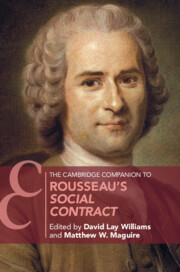Book contents
- The Cambridge Companion to Rousseau’s Social Contract
- Series page
- The Cambridge Companion to Rousseau’s Social Contract
- Copyright page
- Dedication
- Contents
- Contributors
- Acknowledgments
- 1 Introduction
- 2 “Every Legitimate Government Is Republican”
- 3 What If There Is No Legislator?
- 4 Rousseau’s Republican Citizenship
- 5 Rousseau’s Negative Liberty
- 6 Rousseau’s Ancient Ends of Legislation
- 7 Property and Possession in Rousseau’s Social Contract
- 8 Political Equality among Unequals
- 9 On the Primacy of Peoplehood
- 10 Rousseau on Voting and Electoral Laws
- 11 On the Possibility of a Modern Republic
- 12 Rousseau’s Case against Democracy
- 13 Rousseau’s Dilemma, or “Of Civil Religion”
- 14 Entreating the Political
- 15 Civil Religion and Political Unity
- Bibliography
- Index
- Series page
12 - Rousseau’s Case against Democracy
Published online by Cambridge University Press: 28 March 2024
- The Cambridge Companion to Rousseau’s Social Contract
- Series page
- The Cambridge Companion to Rousseau’s Social Contract
- Copyright page
- Dedication
- Contents
- Contributors
- Acknowledgments
- 1 Introduction
- 2 “Every Legitimate Government Is Republican”
- 3 What If There Is No Legislator?
- 4 Rousseau’s Republican Citizenship
- 5 Rousseau’s Negative Liberty
- 6 Rousseau’s Ancient Ends of Legislation
- 7 Property and Possession in Rousseau’s Social Contract
- 8 Political Equality among Unequals
- 9 On the Primacy of Peoplehood
- 10 Rousseau on Voting and Electoral Laws
- 11 On the Possibility of a Modern Republic
- 12 Rousseau’s Case against Democracy
- 13 Rousseau’s Dilemma, or “Of Civil Religion”
- 14 Entreating the Political
- 15 Civil Religion and Political Unity
- Bibliography
- Index
- Series page
Summary
In book III chapter 4 of the Social Contract, Rousseau takes up the political principle established by Montesquieu in the Spirit of the Laws by correlating the form of a polity’s government to the extent of its territory: it is impossible, in his view, to answer once and for all the question of the best regime, without considering the suitability of regime types for particular situations. Yet democracy could still have a crucial advantage in Rousseau’s system: this kind of government confers most power to the people. A republican state seems to call for a democratic regime. This is why Rousseau’s response may come as a surprise: far from being the best form of government, democracy is the worst – or at least it is not suitable for a people of men, not gods. This essay reassesses Rousseau’s case against democracy. Why does Rousseau declare that democracy causes, so to speak, “a government without government,” and threatens popular sovereignty itself? This paradoxical claim needs to be explained.
- Type
- Chapter
- Information
- The Cambridge Companion to Rousseau's Social Contract , pp. 252 - 272Publisher: Cambridge University PressPrint publication year: 2024

